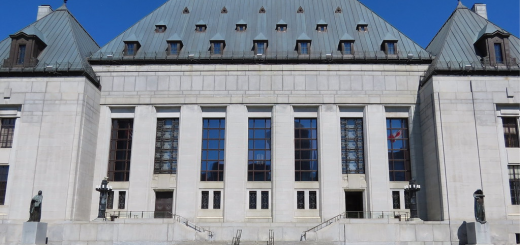The Mainville Appointment and Historical Interpretation: Reference re Section 98 of the Constitution Act, 1867
Rocco Galati’s streak of successful judicial appointment challenges has come to an end. The Quebec Court of Appeal’s (“QCCA”) decision in Reference re Section 98 of the Constitution Act, 1867, 2014 QCCA 2365, allowed Justice Mainville’s appointment to the Quebec Court of Appeal. Toronto lawyer Rocco Galati had challenged this appointment, using the momentum from his successful challenge of Marc Nadon’s appointment last March. He argued that the reasoning used in Nadon’s case should apply here.
The QCCA disagreed, distinguishing the section under which Mainville was appointed from the section under which Nadon was appointed. Their analysis was based on a purposive interpretation of the two sections.
The Nadon Reference and Subsequent Mainville Challenge
In October 2013, Mr. Justice Marc Nadon was appointed to the Supreme Court of Canada. He had previously been appointed to the Trial Division of Federal Court, and had been a member of the Barreau du Quebec for more than 10 years prior to that.
Rocco Galati challenged the Supreme Court appointment, arguing that it was not made in accordance with section 6 of the Supreme Court Act, RSC 1985 c S-26. The Supreme Court’s judgment turned on an interpretation of section 6, which confirmed the requirements that the Quebec seats on the Supreme Court be given only to current members of the Bar of Quebec or current members of the Quebec superior courts. Justice Nadon failed to meet these requirements.
The Court’s previous commentary on the Reference re Supreme Court Act, ss. 5 and 6, 2014 SCC 21 [Nadon Reference], can be found here and here.
Three months after the Nadon Reference was decided, Galati brought a similar challenge against Justice Mainville, who was appointed to the Quebec Court of Appeal from the Federal Court of Appeal on June 13, 2014. Galati argued that Mainville was not a current member of the Bar of Quebec and was thus not eligible for appointment, using the Supreme Court’s interpretation of section 6 of the Supreme Court Act in the Nadon Reference as a basis.
Galati acted as intervener in this case, with the Attorney General of Canada (AGC) supporting his claims. The Attorney General of Quebec (AGQ) opposed this action, along with the Canadian Association of Provincial Court Judges (CAPCJ), the Grand Council of Cree (GCC), and Government of the Cree Nation (GCN), who acted as opposing interveners.
The Court’s Analysis
The main question at issue was whether section 98 of the Constitution Act, 1867 allowed for the appointment of persons who are members of federal courts. Section 98 reads:
“The Judges of the Courts of Quebec shall be selected from the Bar of that Province.”
The court agreed with the Attorneys General (both AGC and AGQ) that “Courts of Quebec” should be interpreted with section 96 in mind, which included the “Superior, district and county courts” of that province. Thus, the Quebec Superior Courts and the Quebec Court of Appeal fell under this ambit.
The key turning point for this decision was the interpretation of “the Bar of that Province.”
Mr. Galati argued that section 98 should be interpreted in the same manner as section 6 of the Supreme Court Act, as per its interpretation in the Nadon Reference. With this interpretation, the contemporaneity principle would apply. This principle means that the appointees must be members of their province’s Bar at the time of their appointment.
The Approach to Statutory Interpretation
The Court distinguished Mainville’s appointment under section 98 from Nadon’s appointment under section 6 of the Supreme Court Act. They acknowledged that if we were to apply the answers from the Nadon Reference here, section 98 would not allow for the appointment of a judge from the federal courts. However, the decision in Nadon was based on specific statutory interpretations and historical contexts that do not apply to section 98. The court here turned to a purposive interpretation of section 98, specifically the phrase “from the Bar of that Province,” in order to explore this issue.
The court noted that section 98 can be interpreted by reference to other sections, by previous judicial interpretations, and by its historical context.
The court referenced other sections by reading sections 97 and 98 together. They argued that both sections “constitute a means to ensure the preservation of local private law,” rejecting the arguments put forth by the AGQ that the sections should be read separately.
Previous judicial interpretations could not help the court’s interpretations here, because this section has largely gone unnoticed. In fact, this is the first time since Confederation that a sitting judge has been appointed from the Federal Court of Appeal to the Quebec Court of Appeal.
The court turned to the section’s historical context to support most of their analysis.
The Historical Context
The AGQ argued that judges must have an on-going tangible connection to Quebec’s civil law tradition, required by the historic tradition of this section. As such, section 98 would require the contemporaneity principle to apply and Justice Mainville would be ineligible for appointment.
However, the court dismissed these claims. This is because the purpose of section 6 in the Supreme Court Act was not only to preserve the civil law tradition in general, but also to allow representation of Quebec’s unique legal traditions on the Supreme Court. The Supreme Court was created from scratch, and so there was a lot of debate about the appointment of judges. Its creation represented the historic compromise between French civil law and English common law and their appointments needed to reflect that.
Section 98 arose in different circumstances. There was little debate about the appointment of judges to superior courts, because mechanisms already existed to do so. It did not arise out of a fear that Quebec’s civil law traditions would be weakened from unrepresentative judicial appointments, nor out of concern that public confidence in judicial institutions would be shaken if the section were to be interpreted otherwise.
The QCCA argued that the sole purpose of the framers in wording “from the Bar of that Province” was simply to make sure that judges from superior courts would 1) be legally trained and 2) be trained in local law. Nothing supports the view that the framers thought any additional requirements – such as being a member of the Bar contemporaneously to being appointed – would be necessary. The court cautioned that “one should be careful not to substitute an essentialist concept of the civil law tradition to one that was simply based on pragmatism” (para 56).
The court agreed with the arguments of the Attorney General of Canada in that ongoing status from a Bar should not be the criteria of section 98, as it would be susceptible to variations from province to province and from era to era. Admission to the Bar is enough, and provides an objective common denominator across all provinces.
For these reasons, the court dismissed Galati’s claims that this appointment should be interpreted under the Supreme Court Reference. The Quebec Court of Appeal found in favour of Justice Mainville’s appointment, supporting AGQ’s arguments.
Commentary
The court distinguishes section 98 of the Constitution Act, 1867 from the Supreme Court Act by concluding that their historical contexts lead to different interpretations. However, their analysis also mentions that judges have often sat first as trial judges before being named to an appellate court. The condition of a person being “from the bar” of the province where the appointment was made has not been followed much over the last few decades.
Promotion of judges to one level of court from another is common and were this to demand stricter requirements, many currently appointed judges would find themselves in a bind. While more emphasis is placed on a purposive interpretation of the two sections, the fact that section 98 has been consistently used in this way likely plays a much more significant role than the court’s analysis indicates.
This decision is an interesting follow-up from the Nadon Reference, particularly given the political flurry when Galati first challenged the Mainville appointment. Galati was particularly vocal about his concerns that this appointment was an attempt by Harper to whoosh Mainville from his new seat on the Court of Appeal straight into the Supreme Court spot left open by LeBel J’s retirement. This concern seemed overhasty in light of Suzanne Cote’s appointment to the open SCC spot in November.
However, given Justice Minister Peter MacKay’s comments indicating the possibility of Mainville’s move to the Supreme Court and Cote’s subsequent shrouded and secretive appointment, there is substance to Galati’s concerns. It is likely that the federal government saw Mainville’s placement in LeBel’s seat as an unwise move, given the publicity and notoriety of a Galati challenge. It will be interesting to see where Mainville ends up, and if Galati turned out to be prescient in this matter.








Join the conversation